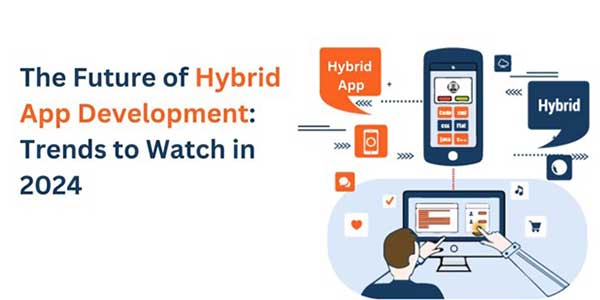
Hybrid apps are not just buzz anymore. These applications are mainstream now, whether as a user, you identify it or not while downloading or using a business application. As Hybrid app development has been adopted significantly among businesses that are evolving their operational methods with digital journey, the choice of hybrid app development services becomes increasingly critical. Amid debates surrounding native and hybrid applications, the latter continues to stand out as a pragmatic and strategic choice for businesses across industries. In this extensive blog post, we’ll delve into the multifaceted reasons why hybrid apps remain not just relevant but a preferred option for companies keen on optimizing their digital footprint. Also, in the later section, we will discuss the top trends you will get to see in the hybrid app development sphere in 2024 and beyond.
Table of Contents
1.) Cost-Effectiveness And Time Efficiency: A Dual Advantage:
The financial aspect of app development is a pivotal consideration for businesses of all sizes. Hybrid apps shine in this regard, offering a dual advantage of cost-effectiveness and time efficiency. The ability to write code once and deploy it across multiple platforms significantly reduces development costs, while simultaneously accelerating the time-to-market for the application. This fiscal prudence allows businesses to allocate resources judiciously, focusing on other critical aspects of their digital strategy.
2.) Wider Market Reach: Breaking Down Platform Barriers:
In an era defined by global connectivity, businesses strive to reach audiences across diverse platforms seamlessly. Hybrid apps present a compelling solution by transcending the traditional barriers of platform-specific development. Compatible with both iOS and Android, these apps empower businesses to target a broader user base without the need for separate and resource-intensive development efforts. For enterprises catering to a diverse clientele, this flexibility is a strategic component of their digital outreach.
3.) Adaptability To Evolving Technologies: Future-Proofing Digital Assets:
The pace of technological evolution is relentless, with new devices and operating systems continually entering the market. Hybrid apps, designed with adaptability in mind, effortlessly navigate these changes. This inherent flexibility serves as a form of future-proofing, sparing businesses the need for constant redevelopment with each technological shift. As the digital landscape evolves, the adaptability of hybrid apps ensures they remain resilient and relevant.
4.) Enhanced User Experience: Bridging The Gap With Native Performance:
Historically, one of the criticisms of hybrid apps centered around performance concerns when compared to native counterparts. However, advancements in hybrid app frameworks, notably React Native and Flutter, have significantly bridged this gap. Leveraging native components, these frameworks offer a level of performance and responsiveness that rivals native apps. Businesses can now deliver a seamless and engaging user experience without compromising on the efficiency of development.
5.) Streamlined Maintenance: Centralized Updates For A Seamless User Journey:
Maintaining and updating apps across different platforms can be a logistical challenge. Hybrid apps simplify this process by allowing updates to be made centrally. This not only streamlines the maintenance workflow but also ensures that users across all platforms have access to the latest features and security patches simultaneously. The streamlined maintenance of hybrid apps contributes to a more efficient and reliable digital ecosystem.
6.) Consistent Branding And Design: Unifying The Digital Identity:
For businesses placing a premium on consistent branding and design elements across their digital spectrum, hybrid apps emerge as a natural choice. With a single codebase, developers can meticulously ensure uniformity in the app’s look and feel, reinforcing brand identity. This consistent aesthetic resonates with users, fostering a sense of familiarity and contributing to a cohesive brand experience across platforms.

New Trends We Can Expect To See In Hybrid App Development Beyond 2024:
The landscape of hybrid app development is ever-evolving, and looking beyond 2024, several trends are poised to shape the future of this field. Here’s a glimpse into what we can expect:
1.) Augmented Reality (AR) Integration: Elevating User Experiences:
As AR technology continues to mature, its integration into hybrid apps is expected to become more prevalent. Beyond simple overlays, hybrid apps are likely to leverage AR for immersive user experiences, blending digital elements with the real world. This trend could be particularly significant for industries like gaming, education, and retail.
2.) Increased Emphasis On Security: Safeguarding User Data:
With the rising concerns about data privacy and security, hybrid app development is expected to place a greater emphasis on implementing robust security measures. Developers will likely integrate advanced encryption techniques, secure APIs, and other security protocols to safeguard user data and ensure compliance with evolving data protection regulations.
3.) Edge Computing Integration: Enhancing Performance:
The integration of edge computing into hybrid apps is anticipated to enhance performance by reducing latency and improving response times. By processing data closer to edge devices, hybrid apps can deliver faster and more efficient experiences, making them more competitive in terms of performance with native applications.
4.) AI And Machine Learning Integration: Personalizing Experiences:
The infusion of AI and machine learning capabilities into hybrid apps is set to revolutionize user experiences. From personalized recommendations to intelligent automation, AI will play a crucial role in making hybrid apps more adaptive and responsive to user behavior. This trend can significantly enhance user engagement and satisfaction.
5.) Cross-Platform Development Standardization: Simplifying Workflows:
As the demand for cross-platform development continues to rise, industry efforts may lead to the standardization of frameworks and tools. This could simplify the development workflow, making it more seamless for developers to create high-quality hybrid apps across different platforms. Standardization may also contribute to a more consistent user experience across various devices.
6.) Progressive Web Apps (Pwas) Integration: Bridging Gaps Between Web And Apps:
The convergence of hybrid apps and Progressive Web Apps (PWAs) is likely to gain traction. This integration can offer users a seamless experience by combining the advantages of web and app functionalities. PWAs enable offline capabilities, fast loading times, and improved discoverability, making them an attractive addition to the hybrid app development toolkit.
7.) Voice Interface Integration: Shaping The Future Of Interactions:
With the growing popularity of voice-activated devices, integrating voice interfaces into hybrid apps is a foreseeable trend. This can enhance accessibility and user convenience, allowing users to interact with apps using natural language. Voice-controlled hybrid apps may find applications in a variety of domains, from virtual assistants to hands-free navigation.
8.) Blockchain Integration For Enhanced Security And Transparency:
Blockchain technology is poised to play a role in hybrid app development by providing enhanced security and transparency. Integrating blockchain can secure transactions, protect user data, and ensure the integrity of information within hybrid apps. This trend could be particularly relevant for industries like finance, healthcare, and supply chain management.
Conclusion:
As we peer beyond 2024, the future of hybrid app development appears dynamic and promising. The integration of emerging technologies, a focus on security and privacy, and efforts to streamline development workflows are set to shape the landscape. Hybrid app development companies and businesses embracing these trends can position themselves at the forefront of innovation, delivering compelling and cutting-edge hybrid app experiences to users worldwide.

 About the Author:
About the Author:
















Hybrid apps in 2024 will become even more focused on interoperability, which will leverage upon frameworks such as Flutter, or React Native, for a unified user experience regardless of device used. Trends like AI-integrated personalized user experiences, AR/VR integrated for immersive apps, and IoT incorporated for connected experiences will be notable. Security will be enhanced through use of enhanced procedures like block chain technology to ensure the users’ data is safe. Moreover, there is need to shift to flexible code architectures that are modular and reusable. Similarly, PWA will revolutionize hybrid app development in the near future due to their ease of use, flexibility, as well as good performance.
Welcome here and thanks for reading our article and sharing your view. This will be very helpful to us to let us motivate to provide you with more awesome and valuable content from a different mind. Thanks again.
Great content,
This article provides insights into the evolving landscape of hybrid app development, discussing potential trends and advancements shaping the future of this technology. It’s crucial to stay informed about these developments to navigate the ever-changing mobile app development industry effectively.
Welcome here and thanks for reading our article and sharing your view. This will be very helpful to us to let us motivate to provide you with more awesome and valuable content from a different mind. Thanks again.